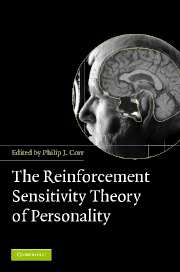Book contents
- Frontmatter
- Contents
- List of abbreviations
- List of figures
- List of tables
- List of contributors
- Preface
- 1 Reinforcement Sensitivity Theory (RST): introduction
- 2 The neuropsychology of fear and anxiety: a foundation for Reinforcement Sensitivity Theory
- 3 Animal cognition and human personality
- 4 The behavioural activation system: challenges and opportunities
- 5 Reinforcement Sensitivity Theory and personality
- 6 Reinforcement sensitivity scales
- 7 Performance and conditioning studies
- 8 Psychophysiological studies
- 9 Reinforcement Sensitivity Theory and mood induction studies
- 10 Neuro-imaging and genetics
- 11 Reinforcement Sensitivity Theory and psychosomatic medicine
- 12 RST and clinical disorders: anxiety and depression
- 13 RST and psychopathy: associations between psychopathy and the behavioral activation and inhibition systems
- 14 Behavioural activation and inhibition in social adjustment
- 15 Reinforcement sensitivity in the workplace: BIS/BAS in business
- 16 Formal and computational models of Reinforcement Sensitivity Theory
- 17 Reinforcement Sensitivity Theory: a critique from cognitive science
- 18 The contribution of Reinforcement Sensitivity Theory to personality theory
- General Index
- Index of Names
- References
16 - Formal and computational models of Reinforcement Sensitivity Theory
Published online by Cambridge University Press: 31 January 2011
- Frontmatter
- Contents
- List of abbreviations
- List of figures
- List of tables
- List of contributors
- Preface
- 1 Reinforcement Sensitivity Theory (RST): introduction
- 2 The neuropsychology of fear and anxiety: a foundation for Reinforcement Sensitivity Theory
- 3 Animal cognition and human personality
- 4 The behavioural activation system: challenges and opportunities
- 5 Reinforcement Sensitivity Theory and personality
- 6 Reinforcement sensitivity scales
- 7 Performance and conditioning studies
- 8 Psychophysiological studies
- 9 Reinforcement Sensitivity Theory and mood induction studies
- 10 Neuro-imaging and genetics
- 11 Reinforcement Sensitivity Theory and psychosomatic medicine
- 12 RST and clinical disorders: anxiety and depression
- 13 RST and psychopathy: associations between psychopathy and the behavioral activation and inhibition systems
- 14 Behavioural activation and inhibition in social adjustment
- 15 Reinforcement sensitivity in the workplace: BIS/BAS in business
- 16 Formal and computational models of Reinforcement Sensitivity Theory
- 17 Reinforcement Sensitivity Theory: a critique from cognitive science
- 18 The contribution of Reinforcement Sensitivity Theory to personality theory
- General Index
- Index of Names
- References
Summary
Jeffrey Gray (Gray 1970, 1981, 1987) developed a ‘bottom-up’ approach to personality which began with the identification of large-scale brain-behavioural systems in animals (based on lesion and psychopharmacological evidence). The systems which he emphasized were: a reward system (later termed the Behavioural Activation System or BAS); a punishment system; an arousal system; and a Fight-Flight System. His view of personality was that inter-individual differences in the functioning of each discrete system should give rise, in human beings, to a major dimension (or trait) of personality. The theory also talked particularly about the sensitivity (i.e., reactivity) of each system to its characteristic inputs (i.e., the inputs which activated that system rather than any of the others). Inter-individual differences in the sensitivities of the systems were taken to be the causal basis of human personality traits. As the names ‘reward system’ and ‘punishment system’ implied, the characteristic inputs of the systems were reinforcing stimuli. To capture these aspects of the theory, I suggested the name Reinforcement Sensitivity Theory (RST) for the personality theory which he developed.
Basic tenets of the original RST
In the original version of the theory (which I shall call ‘old RST’ in this chapter), the personality trait corresponding to variations in functioning of the BAS was suggested to be impulsivity. The punishment system (so-called because it was thought that this system responded to conditioned stimuli signalling impending punishment) was referred to as the Behavioural Inhibition System (BIS): the personality trait corresponding to variations in functioning of the BIS was suggested to be anxiety.
Information
- Type
- Chapter
- Information
- The Reinforcement Sensitivity Theory of Personality , pp. 453 - 481Publisher: Cambridge University PressPrint publication year: 2008
References
Accessibility standard: Unknown
- 14
- Cited by
